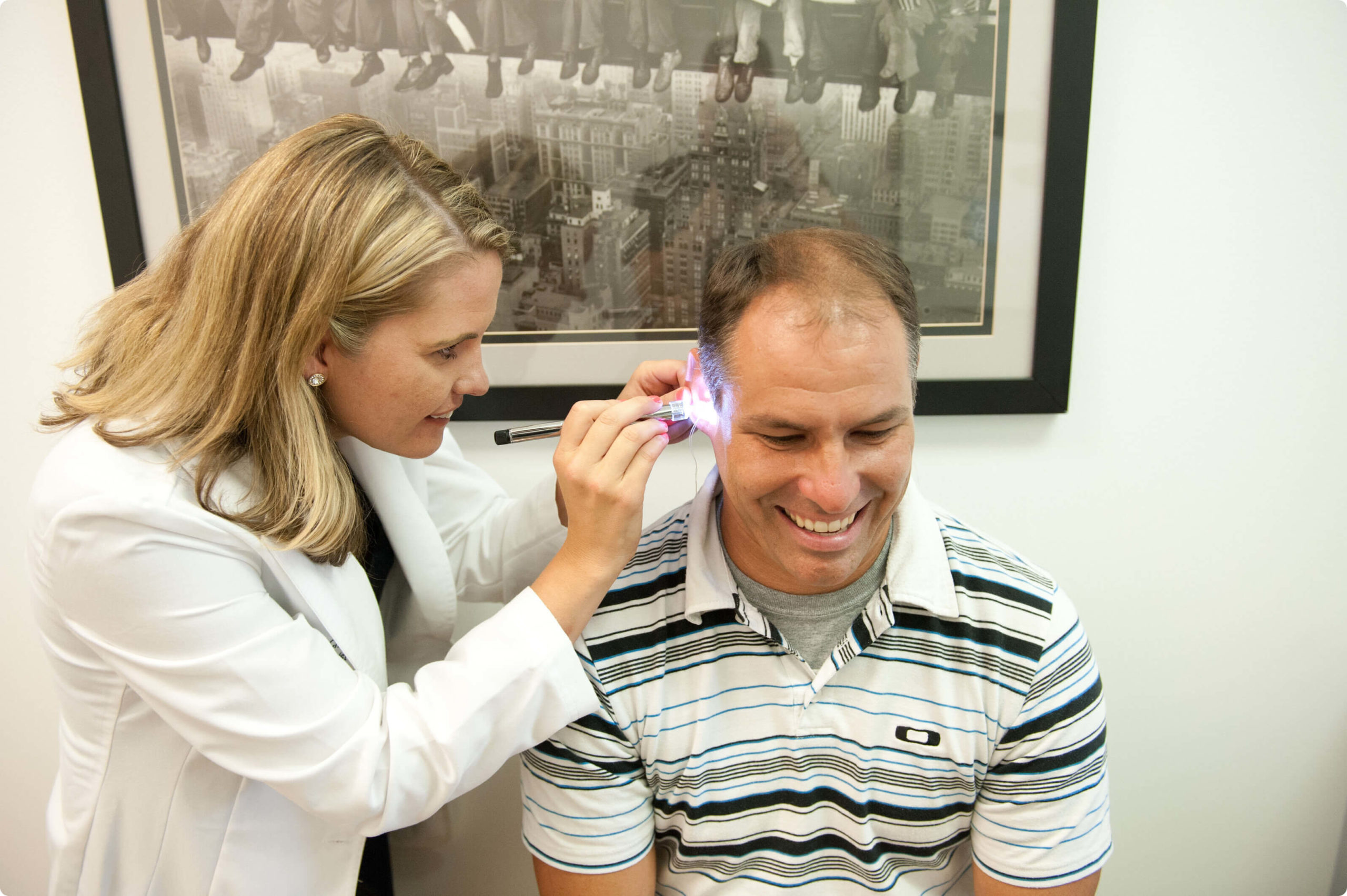Tinnitus Evaluations

Tinnitus is a common disorder with a multitude of possible causes. In most cases, tinnitus is subjective, which means that only the person with the condition can hear it. However, in some cases, tinnitus can be heard by the examiner during tinnitus evaluations.
How common is Tinnitus?
Subjective vs. Objective Tinnitus
Subjective tinnitus may be triggered by metabolic, psychogenic, and neurologic disorders.
Objective tinnitus is usually caused by vascular abnormalities in the carotid artery or jugular venous systems. Tinnitus evaluations should include a thorough medical history, head and neck examination, and an audiometric testing to identify an underlying etiology.
Tinnitus Evaluations: Physical Examination
One of the initial steps in tinnitus evaluations is physical examination. The tympanic membrane and external canal will be inspected for signs of cerumen impaction, infection, or perforation. The cranial nerves will also be examined for evidence of brain-stem damage or hearing loss.
Auscultation over the orbits, mastoid, neck, and periauricular area will also be performance. Tinnitus of venous origin can be suppressed by compression of the ipsilateral jugular vein.
Diagnostic Tests for Tinnitus
Patients with tinnitus should undergo an audiometric assessment, especially since the subjective complaint will usually correlate poorly with actual acoustic properties.
Diagnostic tinnitus evaluations include audiography, tympanometry, and speech discrimination testing.
An audiogram will establish a base from which an audiologist can pursue more advanced diagnostic testing.
Other audiologic measurements of tinnitus include loudness matching, pitch masking, minimum masking level, and residual inhibition. These measurements provide essential information as to whether the tinnitus can be masked using external noise or masking therapy.
Related Questions
What is the most common cause of Subjective Tinnitus?
Otologic problems, specifically hearing loss, are the most common causes of subjective tinnitus. Other otologic problems that are linked to subjective tinnitus include:
- Conductive hearing loss
- External ear infection
- Cerumen impaction
- Middle ear effusion
- Exposure to excessively loud noises
- Presbycusis
- Ototoxic medications
- Meniere’s disease
- Unilateral hearing loss with tinnitus is associated with acoustic neuroma.
What is the most effective treatment for tinnitus?
There is no one specific cure or treatment for tinnitus. In fact, treatment and intervention for this condition is highly-individualized per patient because tinnitus is unique and provides a different experience for each person.
Some of the most effective treatments for tinnitus include masking therapy, using noise-cancelling headphones or hearing aids, cognitive behavioral therapy, and lifestyle changes.
Pinnacle Hearing can help you regain your life back and win over tinnitus. We will begin with a thorough diagnosis so we can map out an effective and highly-personalized tinnitus treatment plan.
What can make Tinnitus worse?
Overexposure to Loud Noise – Loud noises can worsen tinnitus and hearing loss. Wear hearing protection in noisy environments.
Under-exposure to Sound – While loud noises can trigger tinnitus, quiet environments may also make tinnitus louder. People with tinnitus usually find the condition more prominent during bedtime or when they are in a quiet place. You can play a steady background sound or white noise to help drown out tinnitus.
Certain Medications – Ototoxic medications can aggravate tinnitus. Always tell your physician that you have tinnitus so they can avoid prescribing ototoxic medicines.
Alcohol, Nicotine and Caffeine – The substances in alcohol, nicotine and caffeine are known to trigger or aggravate tinnitus. Living a healthy lifestyle and eating clean can help keep tinnitus symptoms at bay.
Stress – It’s still unclear why stress can worsen tinnitus, but researchers have associated anxiety and stress to tinnitus. Taking the time to slow down, relax or meditate can help reduce tinnitus.
Can you pass a hearing test with tinnitus?
Technically, tinnitus can affect hearing tests because the condition makes it harder for you to identify certain words and pitches. Audiologists are trained to administer tests to people with tinnitus.
Living with Tinnitus
For patients who are disturbed by tinnitus, auditory masking may provide relief.
The severity of tinnitus varies from an occasional awareness of a noise (e.g ringing, buzzing, hissing, roaring, clicking sounds) in one or both ears, to an unbearably disturbing sound that interferes with a person’s life and relationships.
Schedule a Tinnitus Evaluation Today.
Living with tinnitus can be challenging; our team at Pinnacle Hearing can help you live a better quality of life and rise above tinnitus. The first step in dealing with tinnitus is proper diagnosis and assessment. If you think that you or a loved one might be experiencing tinnitus, contact us to schedule an appointment at Pinnacle Hearing. We look forward to seeing you!
